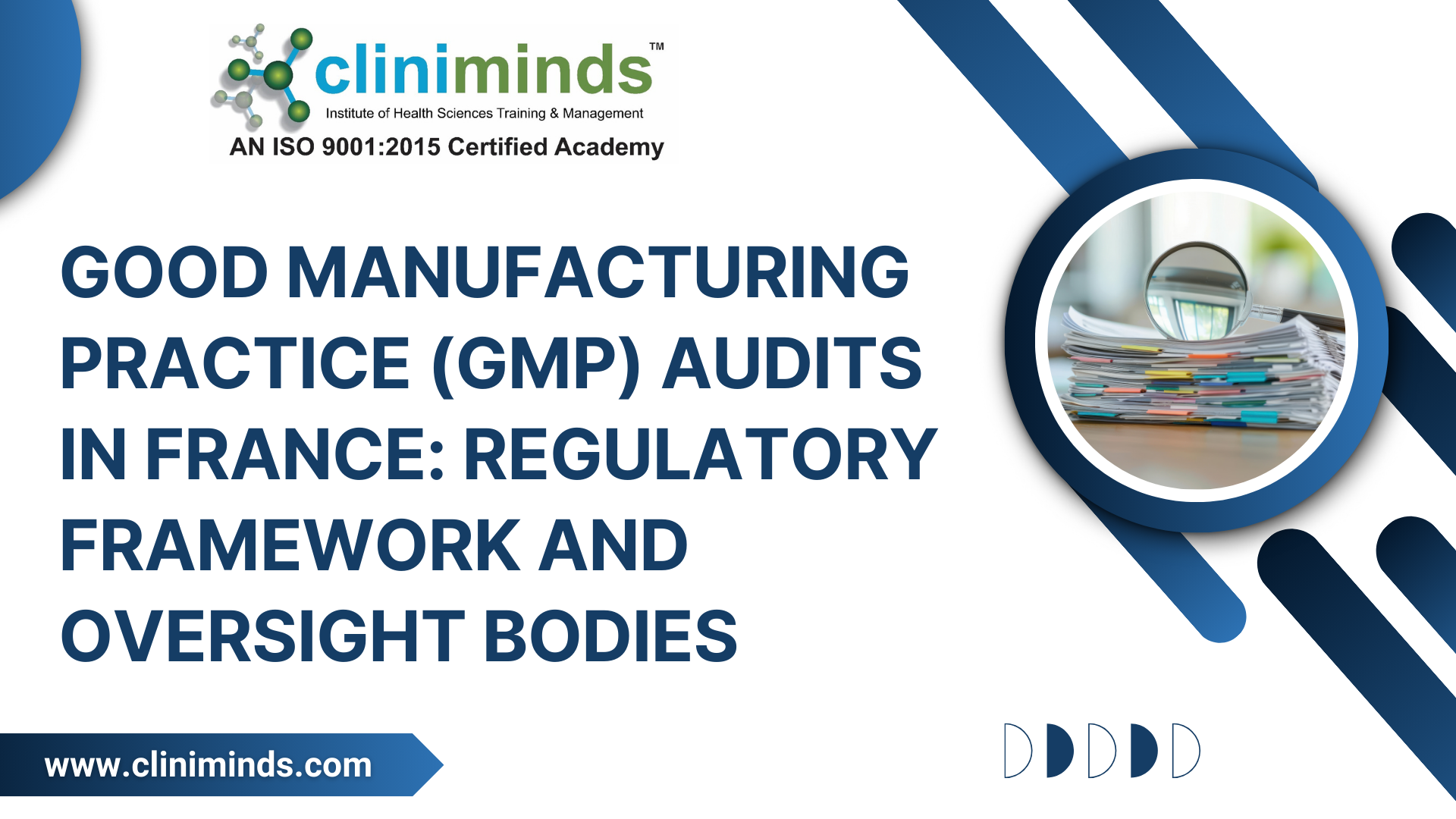Good Manufacturing Practice (Gmp) Audits In France: Regulatory Framework And Oversight Bodies

Good Manufacturing Practice (GMP) audits are essential to ensuring the quality, safety, and efficacy of pharmaceutical, medical device, and cosmetic products. In France, GMP compliance is governed through a blend of European Union (EU) regulations and national laws, with implementation and oversight by national authorities such as ANSM and DGCCRF.
Regulatory Framework
1. European Union Directives and Regulations
As an EU member state, France enforces GMP requirements established by the following key regulations and directives:
- Directive 2001/83/EC: Governs the manufacture and importation of medicinal products for human use.
- Directive 2003/94/EC: Lays down GMP guidelines for medicinal products and active substances. (Note: This has been repealed by Commission Delegated Regulation (EU) 2017/1569 for newer GMP standards.)
- Regulation (EU) 2017/745: Covers GMP and quality assurance systems for medical devices (EU MDR).
- Regulation (EU) 2017/746: Pertains to in vitro diagnostic medical devices (EU IVDR).
- Regulation (EC) No 1223/2009: Governs cosmetic products. Article 8 mandates compliance with GMP, referring to ISO 22716 as the accepted standard.
2. National Implementation
The EU directives are transposed into French law primarily via the French Public Health Code (Code de la santé publique). It outlines the national regulatory framework for:
- Licensing of manufacturers and importers
- Quality assurance standards
- Inspection and enforcement mechanisms
Regulatory Bodies in France
1. ANSM (Agence Nationale de Sécurité du Médicament et des Produits de Santé)
ANSM is the central authority for pharmaceutical and medical product regulation in France. Key roles include:
- Granting manufacturing and import authorisations
- Conducting GMP inspections across pharmaceutical and clinical trial facilities
- Evaluating compliance with EU and French GMP standards
- Recommending corrective and preventive actions (CAPA) where needed
Note: ANSM’s Inspection Division is accredited by COFRAC (French Accreditation Committee) under ISO/IEC 17020, which affirms impartiality, competence, and technical rigor in inspections.
Reference:
https://ansm.sante.fr
2. DGCCRF (Direction Générale de la Concurrence, de la Consommation et de la Répression des Fraudes)
DGCCRF is responsible for ensuring GMP compliance in the cosmetic products sector.
- Enforces ISO 22716 for cosmetics as per Regulation (EC) No 1223/2009
- Carries out inspections of cosmetic manufacturers and distributors
- Recently moved toward mandatory GMP certification for cosmetics made or sold in France
Manufacturers will need to obtain and present GMP certificates demonstrating compliance with ISO 22716.
Reference:
https://www.economie.gouv.fr/dgccrf
Common Findings During GMP Audits
1. Documentation and Record-Keeping
Incomplete or inaccurate records can lead to audit failures. Proper documentation is vital for traceability and accountability.
2. Personnel Training
Lack of role-based GMP training can result in procedural errors. Personnel must be regularly trained and evaluated.
3. Facility and Equipment Maintenance
Non-compliance often arises from poorly maintained equipment or non-validated processes.
4. Data Integrity Issues
Altered or unsecured data, lack of audit trails, and improper electronic records violate GMP principles.
5. Supply Chain Oversight
Failure to audit third-party suppliers or qualify contract manufacturers can jeopardize product quality and regulatory status.
Enforcement and Consequences
Violations identified during audits may result in:
- Administrative Sanctions: Suspension of manufacturing/import licenses, product recalls, or restricted distribution.
- Legal Actions: In serious cases, legal penalties including fines, injunctions, or prosecution.
- Inspection Reports: Published findings (e.g., on EudraGMDP) may influence global regulatory inspections.
Reference:
EudraGMDP: https://eudragmdp.ema.europa.eu/inspections
Recent Trends and Initiatives
- Increased Focus on Data Integrity: French and EU regulators now emphasize ALCOA+ principles (Attributable, Legible, Contemporaneous, Original, Accurate + Complete, Consistent, Enduring, and Available).
- Remote & Hybrid Inspections: Especially post-COVID-19, regulators have adopted remote audits supported by secure electronic data rooms.
- Enhanced Surveillance on APIs and Overseas Manufacturers: ANSM and EMA have ramped up inspections on suppliers in India and China.
Conclusion
GMP audits in France form a crucial part of the country’s and EU’s pharmaceutical and cosmetic regulatory system. ANSM and DGCCRF maintain robust frameworks to ensure high-quality manufacturing practices are followed. Businesses involved in drug and cosmetic manufacturing must maintain continuous compliance through internal audits, training, vendor qualification, and quality systems aligned with both national and EU-level standards.
References
- European Medicines Agency (EMA) – Good Manufacturing Practice
https://www.ema.europa.eu/en/human-regulatory/research-development/compliance/good-manufacturing-practice - ANSM – Inspecting Products and Practices
https://ansm.sante.fr - DGCCRF – GMP in Cosmetics
https://www.economie.gouv.fr/dgccrf - European Commission – EU GMP Guidelines
https://health.ec.europa.eu/system/files/2023-03/gmp_q7_en_0.pdf - EudraGMDP Database
https://eudragmdp.ema.europa.eu/inspections



